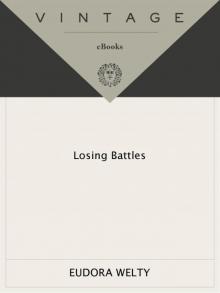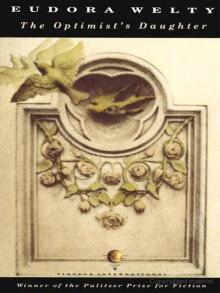- Home
- Eudora Welty
The Robber Bridegroom
The Robber Bridegroom Read online
PRINTED AT THE Country Life Press, GARDEN CITY, N. Y., u. s. A.
UL,
COPYRIGHT, 1942
BY EUDORA WELTY
ALL RIGHTS RESERVED
To Kathcrine Anne Porter
I
I
T WAS the close of day when a boat touched Rodney's Landing on the Mississippi River and Clement Musgrove, an innocent planter, with a bag of gold and many presents, disembarked. He had made the voyage from New Orleans in safety, his tobacco had been sold for a fair price to the King's men. In Rodney he had a horse stabled against his return, and he meant to
spend the night there at an inn, for the way home through the wilderness was beset with dangers.
As his foot touched shore, the sun sank into the river the color of blood, and at once a wind sprang up and covered the sky with black, yellow, and green clouds the size of whales, which moved across the face of the moon. The river was covered with foam, and against the landing the boats strained in the waves and strained again. River and bluff gave off alike a leaf-green light, and from the water's edge the red torches lining the Landing-under-the-Hill and climbing the bluff to the town stirred and blew to the left and right. There were sounds of rushing and flying, from the flourish of carriages hurrying through the streets after dark, from the bellowing throats of the flatboatmen, and from the wilderness itself, which lifted and drew itself in the wind, and pressed its savage breath even closer to the little galleries of Rodney, and caused a bell to turn over in one of the steeples, and shook the fort and dropped a tree over the racetrack.
Holding his bag of gold tight in his hand,
Clement made for the first inn he saw under the
hill. It was all lighted up and full of the sounds
of singing.
Clement entered and went straight to the landlord and inquired, "Have you a bed for the night, where I will not be disturbed till morn-
N»
mg?
"Aye/' replied the landlord, who brushed at a long mustache—an Englishman.
"But where have you left your right ear?" said Clement, pointing to the vacancy. Like all innocent men, he was proud of having one thing in the world he could be sharp about.
And the landlord was forced to admit that he had left the ear pinned to a market cross in Kentucky, for the horse stealing he did.
Clement turned and went on up the road, and the storm was worse. He asked at the next inn, which was equally glittering and bright, indeed he could not distinguish them in his memory from one year's end to the next, if he might be accommodated for the night.
"Aye/* said the landlord, showing his front teeth all of gold.
"But where have you left your left ear?" Clement asked, and he had that man too. The fellow said it had been clipped away in Nashville for the sad trouble he got into after the cockfights.
On he went, the rain worse all the time, until it sounded like the quarreling of wildcats in the cane, and at last, at the very top of the hill, he found an inn where he was able to pronounce the landlord honest.
"Since you appear to be a scrupulous man," he said, "I would like to engage of you a bed for the night, with supper and breakfast, if not too dear."
"To be sure," replied the landlord, the very image of a hare, whose large ears were easily set a-trembling. "But, sir, this is a popular house, if I may say so. You may have one bedfellow, on even two, before the night is over."
At that very moment there came a loud gust of laughter from the grogshop at the side—"Ho! Ho! Ho!"
"But it is early yet/' the landlord said, his ears
beginning to quiver nonetheless. "If you go up
at once, you will be able to take first choice of
place in the bed."
Clement stopped only to eat a supper of beefsteak, eggs, bacon, turkey joints, johnnycake, pickled peaches, plum pie, and a bowl of grog before saying good night to him.
"Pleasant dreams!" the landlord said, and the traveler went up the winding stair.
Clement was the first man to the room. The storm was unabated, the wind was shaking the house like a cat a mouse. The rain had turned to hail. First he hid his moneybag under that end of the pillow which was nearest the door, and then he sat down to take off his boots before getting into bed, such being the rule of the house. But before he got his first boot off, in walked a second traveler.
This was a brawny man six and a half feet high, with a blue coat, red shirt, and turkey feather stuck in his cap, and he held a raven on
his finger which never blinked an eye, and could
say,
"Turn hack., my liowny,
Turn away home."
"Ah, stranger," said this fellow to Clement, striding up. 'It's been a long time since we slept together/'
"So it has/' said Clement.
"Have you got the same old smell you had before?" asked the stranger, and Clement did not say no.
"Are you just as lousy as ever?" he roared, and Clement said he was.
"Then shake hands!"
Before Clement could get the second boot off, the third traveler walked in.
He w^as as brawny as the other, though but six feet tall, and dressed up like a New Orleans dandy, with his short coat knotted about him cape wise. But for some reason he wore no hat, and his heavy yellow locks hung over his forehead and down to his shoulders.
"Ah, stranger/' said he to the second traveler.
"Crowded days! It's been a long time since our heads were side by side on the pillow/'
"Long as forever!'' sang out the other.
Then Clement knew they were all three strangers to one another, with the stormy night ahead.
When the third traveler removed his cloak, there was a little dirk hid in the knot, which he placed with his moneybag under the pillow. And there were the three bags of gold sitting there side by side, like hens on their nests. So Clement held up the snuffer over the light.
"Wait!'' said the third traveler. "Are we dreaming already? We are going off without the last nightcap, gentlemen."
"Ho! Ho! Ho!" said the second traveler, punching himself in the forehead and kicking himself in the breeches. "That is a thing I seldom forget, for my mind is as bright as a gold piece."
All three of them sat and uncorked their jugs and at the same moment drank down. And when they looked up, the second traveler had drunk the whole jugful.
"Remarkable!" said the yellow-haired stranger, who had made way with half a jug. Poor Clement, who had swallowed only a fourth, could say nothing.
"That was only a finicky taste/' replied the other, and throwing off his hlue coat, he yelled,
<(T~ ' 1 I"
Drink again!
And he seized Clement's own jug out of his finger and emptied it.
"A master!" said Yellowhair. "But I dare say that is the end, the show is over. You can do no more/'
"Ho! Ho!" said the other, and taking off his red shirt and filling his bristling chest with a breath of air, he seized the other's own jug and finished it off.
Then, sailing his cap in the air, he gave a whistle and a shake and declared that he was none other than Mike Fink, champion of all the flatboat bullies on the Mississippi River, and was ready for anything.
"Mike Fink! Well now," said the yellow-haired stranger, and putting his head to one side studied him with all the signs of admiration.
"Yes indeed I am," said the flatboatman crossly. "Am I not Mike Fink, as you live and breathe?" he roared at Clement.
It was a cautious night, but Clement believed him, until the yellow-haired stranger said, "Well, I doubt it."
"You doubt that I am Mike Fink? Nevertheless, it is true!" yelled the flatboatman. "Only look!" And he doubled up his fists and r
ippled the muscles on his arms up and down, as slow as molasses, and on his chest was the finest mermaid it was possible to have tattooed at any port. "I can pick up a grown man by the neck in each hand and hold him out at arm's length, and often do, too," yelled the flatboatman. "I eat a whole cow at one time, and follow her up with a live sheep if it's Sunday. Ho! ho! If I get hungry on a voyage, I jump off my raft and wade across, and take whatever lies in my path on shore. When I come near, the good folk take to their heels and run from their houses! I only laugh at the Indians, and I can carry a dozen oxen on my back at one time, and as for pigs, I tie them in a bunch and hang them to my belt!"
"Strike me dead!" said the yellow-haired stranger, and he yawned, got into bed, and shut his eyes.
"I'm an alligator!" yelled the flatboatman, and began to flail his mighty arms through the air. "I'm a he-bull and a he-rattlesnake and a he-alligator all in one! I've beat up so many flatboat-men and thrown them in the river I haven't kept a count since the flood, and I'm a lover of the women like you'll never see again." And he chanted Mike Fink's song: "I can outrun, out-hop, outjump, throw down, drag out, and lick any man in the country!"
"Go down to the corner and buy yourself a new jug," said the yellow-haired stranger. His eyes were shut tight still, though Clement's, you may be sure, were open wide. "You're still nothing but an old buffalo."
"So I lie?" bellowed the flatboatman, and, leaping out of his breeches, he jumped across the room in three jumps and said, "Feast your eyes upon me and deny that I am Mike Fink."
Clement was ready to agree, but the yellow-
THE ROBBER BRIDEGROOM n
haired stranger said, "Why, you're nothing but an old hoptoad, you will make me mad in a minute. Now what is it you want? If you want to fight, let us fight/'
At that, the flatboatman gave one soul-reaching shout and jumped into the featherbed and burst it, and the yellow-haired stranger leaped up with a laugh, and the feathers blew all around the room like the chips in a waterspout. And out the window it was storming, and from the door the raven was saying,
"Turn again, my bonny, Turn away home."
As for Clement, he removed himself, since he was a man of peace and would not be wanted on the scene, and held the candle where it would be safe and at the same time cast the best light, and all the while his bedfellows sliced right and left, picked each other up, and threw each other down for a good part of the night. And if he sneezed once, he sneezed a thousand times, for the feathers.
Finally the flatboatman said, "Let us stop and seize forty winks. We will take it up in the morning where we leave off tonight. Agreed?"
"Certainly," said the other, dropping him to the ground where he was about to throw him. "That is the rule Mike Fink would make, if he were here."
"Say once more that I am not Mike Fink and, peace or no peace, that will be your last breath!" cried the flatboatman. And then he said cunningly, "If by now you don't know who I am, 1 know who you are, that followed this rich planter to his bed."
"Take care," said the other.
"I will bet all the gold that lies under this pillow against the sickening buttons you wear sewed to your coat, that your name is Jamie Lock-hart! Jamie Lockhart the "
"Take care," said the other once more, and he half pulled out his little dirk.
"I say for the third time that your name is Jamie Lockhart, the I-forget-what," said the flat-boatman. "And if that does not make it so, we
will leave the decision to this gentleman, whose name has not yet been brought out in the open."
The poor planter could only say, "My name, about which there is no secret, is Clement Mus-grove. But I do not know Jamie Lockhart, any more than I know Mike Fink, and will identify neither/'
"I am Mike Fink!" yelled the flatboatman. "And that is Jamie Lockhart! And not the other way around, neither! You say you do not know who he is—do you not know what he is? He is
a " And he took hold of Clement like a mother
bear and waltzed him around, whispering, "Say it! Say it! Say it!"
The poor man began to shake his head with wonder, and he did not like to dance.
But the yellow-haired stranger smiled at him and said coolly enough, "Say who I am forever, but dare to say what I am, and that will be the last breath of any man."
With that delivered, he lay down in the bed once more, and said to Mike Fink, "Blow out the candle."
TLe flatboatman immediately closed his mouth, put his breeches and shirt and his coat back on, blew out the candle, and fell into the bed on one side of Jamie Lockhart, if it was he, while the planter, deciding that affairs were at rest for the evening, lay down on the other.
But no sooner had Clement given a groan and got to the first delightful regions of sleep than he felt a hand seize his arm.
"Make no sound, as you value your life/' whispered a voice. "But rise up out of the bed/'
The storm was over, and the raven was still, but who knows whether he slept? It was the yellow-haired man who had whispered, and Clement had to wonder if now he should find out what Jamie Lockhart was. A murderer? A madman? A ghost? Some outlandish beast in New Orleans dress? He got to his feet and looked at his companion by the pure light of the moon, which by now was shining through the shutter. He was remarkably amiable to see. But by his look, nobody could tell what he would do.
So he led Clement to a corner, and then placed
two bundles of sugar cane, that were standing by the wall, in their two places in the bed.
"Why is that?" said Clement.
"Watch and wait/' said he, and gave him a flash in the dark from his white teeth.
And in the dead of the night up rose Mike Fink, stretching and giggling, and reaching with his hands he ripped up a long board from out of the floor.
As soon as it came under his touch, he exclaimed in a delighted whisper, "Particle of a flatboat you are! Oh, I would know you anywhere, I'd know you like a woman, I'd know you by your sweet perfume." He gave it a smack and said, "Little piece of flatboat, this is Mike Fink has got you by the tail. Now go to work and ruin these two poor sleeping fools!"
Then he proceeded to strike a number of blows with the plank, dividing them fairly and equally with no favorites between the two bundles of sugar cane lying between the feathers of the bed.
"There! And there! If we have left you one whole bone between you, I'm not the bravest
creature in the world and this pretty thing never sprang from a flatboat," he said.
Next, reaching under the tatters of the pillow, he snatched all three bags of gold, like hot johnnycakes from a fire, and lying down and stretching his legs, he went to sleep at once, holding the gold in his two hands against his chest and dreaming about nothing else.
When all was still once more, Clement stretched forth his hand and said, "Are you Jamie Lockhart? I ask your name only in gratitude, and I do not ask you what you may be/'
"I am Jamie Lockhart," said he.
"How can I thank you, sir, for saving my life?"
"Put it off until morning," said Jamie Lock-hart. "For now, as long as we are supposed to be dead, we can sleep in peace."
He and the planter then fell down and slept until cockcrow.
Next morning Clement awoke to see Jamie Lockhart up and in his boots. Jamie gave him a signal, and he hid with him in the wardrobe and watched out through the crack.
So Mike Fink woke up with a belch like the roar of a lion.
"Next day!" announced Mike, and he jumped out of bed. With a rousing clatter the moneybags fell off his chest to the floor. "Gold!" he cried. Then he bent down and counted it, every piece, and then, as if with a sudden recollection, he stirred around in the bed with his finger, although he held his other hand over his eyes and would not look. "Nothing left of the two of them but the juice," said he.
Then Jamie Lockhart gave Clement a sign, and out they marched from the wardrobe, not saying a thing.
The flatboatman fell forward as if the grindstone were hung
about his neck.
"Bogeys!" he cried.
"Good morning! Could this be Mike Fink?" inquired Jamie Lockhart politely.
"Holy Mother! Bogeys for sure!" he cried again.
"Don't you remember Jamie Lockhart, or has it been so long ago?"
"Oh, Jamie Lockhart, how do you feel?"
"Fine and fit/'
"Did you sleep well?"
"Yes indeed/' said Jamie, "except for some rats which slapped me with their tails once or twice in the night. Did you notice it, Mr. Mus-grove?"
"Yes/' said Clement, by the plan, "now that I think of it."
"I do believe they were dancing a Natchez Cotillion on my chest," said Jamie.
And at that the flatboatman cried "Bogeys!" for the last time, and jumped out the window. There he had left three sacks of gold behind him, Clement Musgrove's, Jamie Lockhart's and his own.
"Gone for good," said Jamie. "And so we will have to get rid of his gold somehow."
"Please be so kind as to dispose of that yourself," Clement said, "for my own is enough for me, and I have no interest in it."
"Very well," said he, "though it is the talking bird that takes my fancy more."
"You may have that and welcome. And now tell me what thing of mine you will accept, for you saved my life/' said the planter in great earnestness.
Jamie Lockhart smiled and said, '1 stand in need of one thing, it is true, and without it I may even be in danger of arrest."
"What is that?"
"A Spanish passport. It is only a formality, and a small matter, but I am a stranger in the Natchez country. It requires a recommendation to the Governor by a landowner like yourself/'
"I w r ill give it gladly," said Clement. "Before you go, I will write it out. But tell me—will you settle hereabouts?"
"Perhaps," said Jamie, making ready to go. "That is yet to be seen. Yet we shall surely meet again," he said, knotting the sleeves of his coat about his shoulders and taking up the bird on his left forefinger. It said at once, as though there it belonged,
"Turn back, my bonny, Turn away home."
Clement decided then and there to invite this man to dine with him that very Sunday night. But first, being a gullible man, one given to trusting all listening people, Clement sat Jamie Lock-hart down in the Rodney inn, looked him kindly in the face, and told him the story of his life.

 On Writing
On Writing Losing Battles
Losing Battles The Robber Bridegroom
The Robber Bridegroom The Optimist's Daughter
The Optimist's Daughter The Collected Stories of Eudora Welty
The Collected Stories of Eudora Welty Delta Wedding
Delta Wedding The Ponder Heart
The Ponder Heart